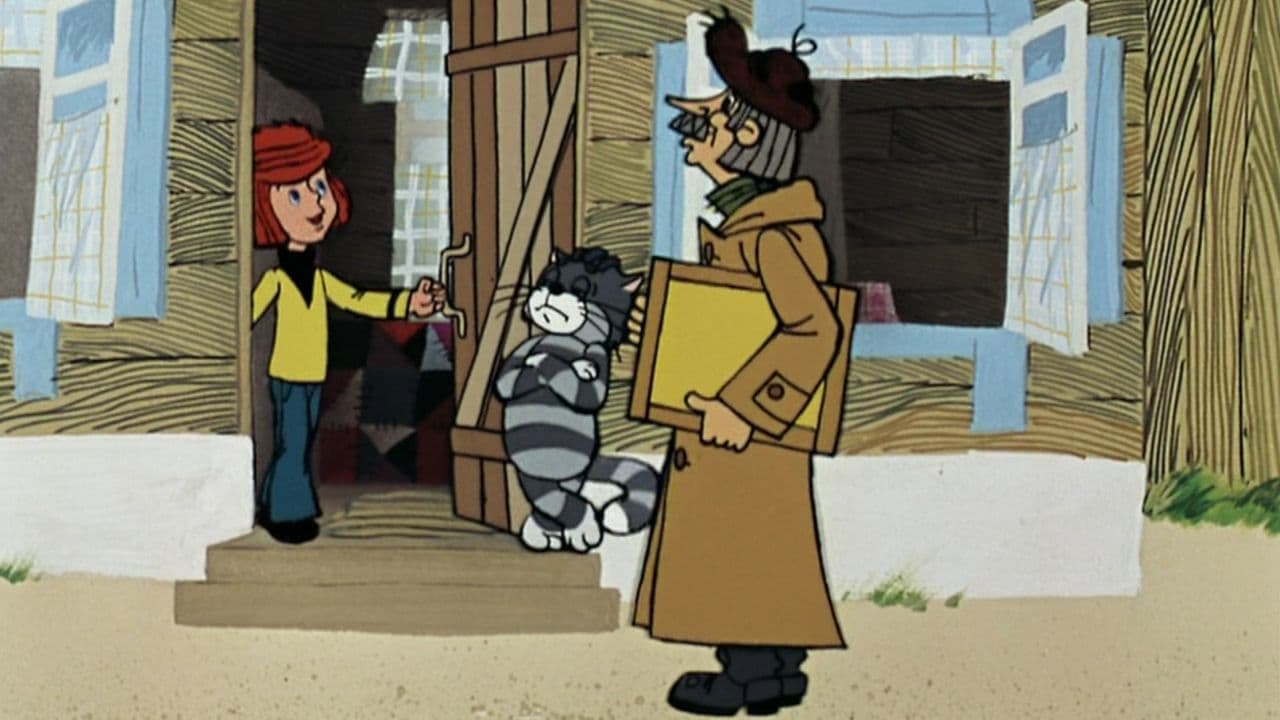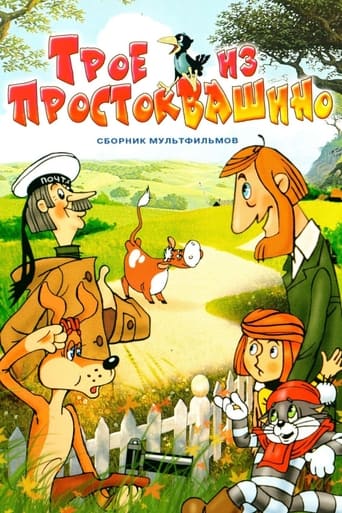

It was a strange thing about Uspensky's stories either "Сheburashka" or "Prostokvashino" that in written book form it was a kind of a psychotic adult graphomanic Jew humour pulp for kids, because nobody else gonna read this uneasy reading, but when his books sourced material for cartoons, it became an instant hit. In case with "Prostokvashino" success was reached from the second attempt. The first screening of "Prostokvashino" was cut out figures animation, and was unknown to me until this year 2016. But from the second attempt, when they used different animation style, remade the entire story according to the normal standards of the Soviet comedy, invited famous actors to dub the animals, the cartoon turned an instant hit. Imagine a 7 year old kid and a stray cat leave home, find an abandoned house in a distant village, a stray dog joins them, and they three start their own household. All economic issues are solved easily - they go outside the village, dig the earth and find a hidden treasure chest. A local postman becomes their antagonist. Finally parents get to know the location and take their kid home, while cat and dog stay to look after the house. In further series, mom and dad got to love the village , first dad, then mom, and to make their choice between sea beach and the village. The third part features Happy New year in village. This cartoon features the phenomena of soviet comedy, when you don't have to produce 500 parts like Tom & Jerry, but even 2 last parts can be excessive, because all super-catchphrases (like cat's "how wrong is your sandwich eating, you should turn your sandwich sausage down, for sausage contacts your tongue, that's much more tasty", or mom's "I thought cats are capable only of yelling on trees", or postman's "Why I was angry ? Because I didn't have a bicycle. But when I have a bicycle now I will start to grow much kinder and get a pet.", or dad's "I know you (mom) for a longer time, and this cat I see for the first time", or birds's "Who is there ?") are coming from the first part only, which can be considered as 20 minutes catchphrases concentrate. So first part is sizzling hot, second part is pretty hot, and third part is nicely warm. I can not remember any catchphrase from the third part I would even like to repeat. The general idea of the series is kids need pets and a call for village life. Also nuances of personal relationships are explored with soft kind humour, all time cat's sentence on dog: "Somehow it seems to me that we are feeding this dog in vain". With this message delivered with lots of kindness and humour the "Prostokvashino" series stand out as Soviet urban classics.
... View More"Three from Prostokvashino" is a Soviet 18-minute short film from over 35 years ago. It was directed by Vladimir Popov and written by Eduard Uspenskiy. Both worked on several other famous animated films. The story here is about a boy who is not allowed to have a cat as a pet. so he leaves home and moves into his own place where he has a cat and dog. The cat is more the reasonable type, the dog is really more the loyal one in terms of their friendship to the boy. I must say I did not find the animation typically Soviet, but there are other components (apart from the language of course) that had Russian written all over them. One would be that it is fairly common in these films that grown women speak young male characters. Or that (speaking) animals are fairly common, there's not only a cat and dog in here, but also a bird and a cow for example. Another would be the humour, especially the last scene with the postman and the bike. If you enjoyed this film, make sure to check out the sequels. I personally thought it was a decent watch, solid animation, okay humour and heart, but there was nothing really outstanding about it. Still I recommend it I guess. Not bad by any means.
... View MoreAmong the more perfect Soviet cartoons. No possible complaints about this one. It's compassionate, charming, and clever. A considerate, principled, not-vomit-inducingly-adorable boy, some witty anthropomorphic household pets, some bantering grown-ups to keep the adult contingency entertained, a hapless proletariat postal worker, and sincere, uncondescending Soviet wholesomeness and humor. Who could ask for anything more? Looking back at the pop culture of the Soviet sixties and seventies, when movies were original and funny, and cartoons were earnest and idealistic, when there wasn't sarcasm or cynicism, it does give you the perhaps entirely false but nonetheless sober impression that Soviet citizens were once happy, for a time. This cartoon is one of the reason Russians look back at this era nostalgically and to watch this cartoon is to fondly recollect the warmth and wit that that part of the world lost in the past two decades
... View MoreI've seen the cartoon several times, since I was a child (I was born in Russia). It is based on a sweet book, which I've also read. It is preferable for one to know Russian for a full understanding of the wit and the humor in the story, but not so necessary. It is a unique cartoon that is watched and loved by several generations in Russia (my parents love it)and for very good reasons: clean but not childish humor, smart characters and nice songs. For someone who grew outside of Russia, it will be interesting to see the life of an ordinary Russian family back in the 70's, or to be exact - how it was portrayed through a cartoon. The quotes from the cartoon are known to almost everyone in Russia.
... View More